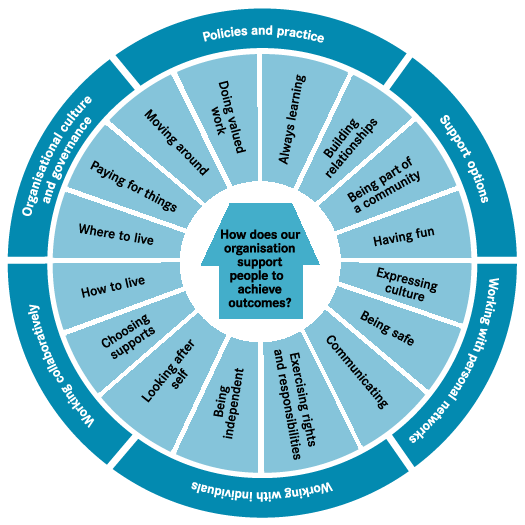Measuring quality
Disability service providers will measure the quality of their practice by gathering data against evidence indicators that describe areas of life that are important to people (Outcome Standards) and areas of good practice that are important to organisations (Industry Standards).
Areas of life important to people
The areas of life important to people are:
- Always learning – people with a disability experience lifelong learning and education.
- Being part of a community – people with a disability participate in the life of the community.
- Being independent – people with a disability experience individual choice and control over their life.
- Being safe – people with a disability experience physical and emotional safety and are free from abuse, neglect and avoidable injury.
- Building relationships – people with a disability experience healthy, constructive and respectful relationships.
- Choosing supports – people with a disability choose their own supports and contribute to determining the manner in which supports are provided.
- Communicating – people with a disability seek, receive and impart information, ideas, opinions and feelings through their preferred communication style.
- Doing valued work – people with a disability experience meaningful and rewarding employment with just and reasonable conditions.
- Exercising rights and responsibilities – people with a disability exercise human rights.
- Expressing culture – people with a disability experience a sense of cultural identity and belonging.
- Having fun – people with a disability experience a sense of social wellbeing through enjoyment of life and time for leisure and recreation.
- How to live – people with a disability experience an adequate standard of living through exercising control over their living circumstances.
- Looking after self – people with a disability experience the best possible physical, mental, emotional and social health.
- Moving around – people with a disability move freely in their environments and in the community.
- Paying for things – people with a disability experience an adequate standard of living through exercising control over finances.
- Where to live – people with a disability experience an adequate standard of living through access to adequate and appropriately located housing.
Areas of good practice important to organisations
The Quality Framework defines six organisational practice areas. These practice areas cover the things that organisations have defined as important to the day-to-day operations of a disability service provider.
The organisational practice areas are:
- organisational culture and governance
- policies and practice
- support options
- working with the individual
- working with personal networks
- working collaboratively.
The organisational practice areas can be used to develop tools to measure the quality of the systems, processes and practices that disability service providers have in place to support people with a disability to experience outcomes.
 |
The diagram depicts how the areas of life important to people and the organisational practice areas work together to support outcomes for people with a disability. |
